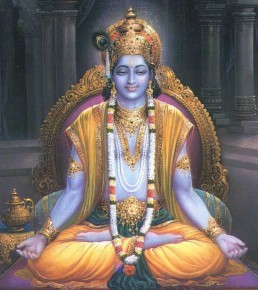Swami Chinmayananda
Swami Chinmayananda Commentary
Actions we will have to perform. Without action no living organism can continue living. Existence itself is the manifestation of life’s activities. To remain without doing anything is itself an action, and the physiological and psychological actions continue upto the grave. Anything that has a body, even a unicellular organism, can never hope to abandon ALL activities. Actions are the insignia of life. It is the fragrance in the flower-of-existence. Where there is no action, there life has ended; there existence has withered away — the substance has dried up… stinking death has come.
Since all of us are embodied, and therefore, cannot abandon all activities as long as we live, the only choice left to us is to direct and discipline all our actions in such a way as to bring a harmony into our inner life and a dynamic rhythm into our outer duties.
If Tyaga of the Sattwic type is not possible for all of us due to our attachments to the world of matter, certainly we can practise the ‘abandonment’ of at least our clinging attachments and anxieties for the fruits of our actions. Action cannot be completely abandoned by one who is conditioned by the gross, subtle and causal bodies. Such an individual — and most of us at this stage of our evolution fall under this category — is advised by Krishna to abandon his anxiety to enjoy the fruits of his actions which are yet to come in a future period of time and act diligently, entirely, and enthusiastically in the present. A man who thus abandons the thirst to enjoy the fruits of his action is called a tyagi.
NOW WHAT IS THE BENEFIT WHICH COMES FROM ‘TYAAGA’? THE LORD ANSWERS:
Adi Sankara Commentary
Deha-bhrta, for one who holds on to a body-one who maintains (bibharti) a body (deha) is called a deha-bhrt. One who has self-indentification with the body is called a deha-bhrt, but not a so a man of discrimination; for he has been excluded from the eligibility for agentship by such texts as, ‘He who knows this One is indestructible…’ etc. Hence, for that unenlightened person who holds on to the body, he, since; it is na, not; sakyam, possible; tyaktum, to give up, renounce; karmani, actions; asesatah, entirely, totally; therefore the ignorant person who is competent (for rites and duties), yah, who; tu, on the other hand; karma-phala-tyagi, renounces results of actions, relinquishes only the hankering for the results of actions while performing the nityakarmas; sah, he; is abhidhiyate, called; tyagi iti, a man of renunciation-even though he continues to be a man of rites and duties. This is said by way of eulogy. Therefore total renunciation of actions is possible only for one who has realized the supreme Truth, who does not hold on to the body, and who is devoid of the idea that the body is the Self. Again, what is that purpose which is accomplished through renunciation of all actions? This is being stated:
The Bhagavad Gita with the commentary of Sri Sankaracharya – Translated by Alladi Mahadeva Sastry
Holy Geeta – Commentary by Swami Chinmayananda
The Bhagavad Gita by Eknath Easwaran – Best selling translation of the Bhagavad Gita
The Bhagavad Gita – Translation and Commentary by Swami Sivananda
Bhagavad Gita – Translation and Commentary by Bhaktivedanta Swami Prabupadha
Srimad Bhagavad Gita Chapter 18 – Verse 11 – 18.11 na hi dehabhrta – All Bhagavad Gita (Geeta) Verses in Sanskrit, English, Transliteration, Word Meaning, Translation, Audio, Shankara Bhashya, Adi Sankaracharya Commentary and Links to Videos by Swami Chinmayananda and others – 18-11

